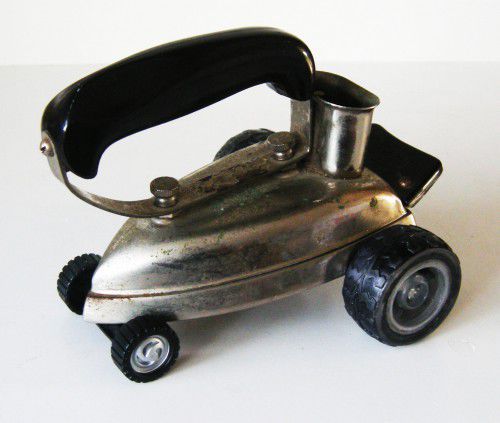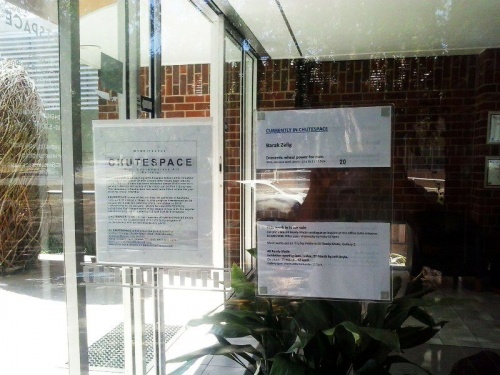IT can’t be easy being a bloke these days.
When the director of M16 Artspace, Jas Hugonnet, saw the artist statement attached to a work satirising the humble domestic iron by local artist Barak Zelig, he blew a fuse at its “sexism” and demanded that the statement be modified.
Meantime Zelig, who had told “CityNews” recently that he created the sculpture to mark International Women’s Day, clearly thought he was being a Sensitive New Age Guy.
So who was right and how is it that a humble household implement has become the object of a debate about artistic freedom? I must confess to having had a quiet gender-biased giggle at the installation, but then I would, wouldn’t I?
First to the statement, emailed to us as Zelig was setting up “Domestic wheel power for men”, 2015, for exhibition in the Chutespace (Gallery 4) at the entrance to M16.
“This sculpture is a protest about domestic work performed mainly by women – full-time, unpaid work that is not recognised as work but rather as their domestic duty.
Women who also work outside, return home at the end of the day to work again.
Will men be more interested to do the ironing if the iron was a car?”
It was the last part that enraged Hugonnet – a family man well known for pulling his weight – with its implication that “the role of women is to work all day and work all night”, while many men in fact “chip in 50-50.”
In Hugonnet’s view, the statement, placed so prominently at M16 was a clear case of gender stereotyping. He told “CityNews” that he had suggested a reworking of the statement to tone down the stereotype. “I didn’t think it was appropriate for a contemporary art space to represent this stereotype,” adding that as the hosting gallery for a free exhibition, “we have the final say.”
Zelig, for his part. Says “it is actually anti-sexism. It is about men and women as equals; a message that I refer to in many works and discussions and that I am always in favour of. In meeting with the director the following day, I was told that I need to change my statement because it is an idea of the 50s; that it creates differences between genders and every line in it is sexist.”
This, Zelig says, “is a total misunderstanding of my statement and well-documented attitudes.”
But the storm in the ironing room does not end there.
After an attempt to resolve the issue, which involved suggesting the addition of the word ‘many’ before “women” in the second paragraph to validate the statement, there was a rewrite by the director.
Encouraged by a fellow-artist concerned about freedom of artistic expression, Zelig then decided to display the information paper without the middle section where the statement had been.
“I am writing a petition and collecting signatures of anyone agreeing that the statement is not sexist and that artists deserve a freedom of speech.” He notes that his installation was opened at the same time as group exhibition called “Protest” for which none of the statements were edited or removed.
Hugonnet declared himself totally flabbergasted by what has happened, describing the way the issue has blown out as “ridiculous.”
It is believed that M16 is working on a clause to be inserted into the agreement with artists that will allow alteration to artists’ statements.
Passionate as the humble observer at this desk is about artistic freedom, isn’t it time for everyone to chill out?
The post Storm over an iron at M16: time to chill out? appeared first on Canberra CityNews.

